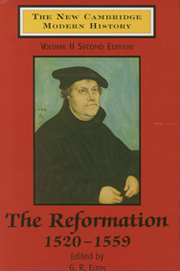Book contents
- Frontmatter
- Introduction to the second edition
- Chapter I The age of the Reformation
- Chapter II Economic change
- Chapter III The reformation movements in Germany
- Chapter IV The Reformation in Zurich, Strassburg and Geneva
- Chapter V The Anabaptists and the sects
- Chapter VI The Reformation in Scandinavia and the Baltic
- Chapter VII Politics and the institutionalisation of reform in Germany
- Chapter VIII Poland, Bohemia and Hungary
- Chapter IX The Reformation in France, 1515–1559
- Chapter X The Reformation in England
- Chapter XI Italy and the papacy
- Chapter XII The new orders
- Chapter XIII The empire of Charles V in Europe
- Chapter XIV The Habsburg–Valois wars
- Chapter XV Intellectual tendencies
- Chapter XVI Schools and universities
- Chapter XVII Constitutional development and political thought in western Europe
- Chapter XVIII Constitutional development and political thought in the Holy Roman Empire
- Chapter XIX Constitutional development and political thought in eastern Europe
- Chapter XX Armies, navies and the art of war
- Chapter XXI The Ottoman empire 1520–1566
- Chapter XXII Russia, 1462–1584
- Chapter XXIII The New World, 1521–1580
- Chapter XXIV Europe and the East
- Index
- References
Introduction to the second edition
Published online by Cambridge University Press: 28 March 2008
- Frontmatter
- Introduction to the second edition
- Chapter I The age of the Reformation
- Chapter II Economic change
- Chapter III The reformation movements in Germany
- Chapter IV The Reformation in Zurich, Strassburg and Geneva
- Chapter V The Anabaptists and the sects
- Chapter VI The Reformation in Scandinavia and the Baltic
- Chapter VII Politics and the institutionalisation of reform in Germany
- Chapter VIII Poland, Bohemia and Hungary
- Chapter IX The Reformation in France, 1515–1559
- Chapter X The Reformation in England
- Chapter XI Italy and the papacy
- Chapter XII The new orders
- Chapter XIII The empire of Charles V in Europe
- Chapter XIV The Habsburg–Valois wars
- Chapter XV Intellectual tendencies
- Chapter XVI Schools and universities
- Chapter XVII Constitutional development and political thought in western Europe
- Chapter XVIII Constitutional development and political thought in the Holy Roman Empire
- Chapter XIX Constitutional development and political thought in eastern Europe
- Chapter XX Armies, navies and the art of war
- Chapter XXI The Ottoman empire 1520–1566
- Chapter XXII Russia, 1462–1584
- Chapter XXIII The New World, 1521–1580
- Chapter XXIV Europe and the East
- Index
- References
Summary
The first edition of this volume was written between 1953 and 1956, and the more than three decades since that time have witnessed an exceptional outburst of new research and fresh interpretations. Thus it has unquestionably become desirable to offer to readers and students a revised version of the Reformation story. Perhaps the volume should have been replaced by a totally new one, but so drastic a step was neither feasible nor yet, as it turned out, necessary. The revision was undertaken in part by the original contributors: all survivors have had the opportunity to review and where necessary rewrite their chapters. Several pieces contributed by authors no longer with us have been replaced or rewritten by living scholars. For one chapter (XVII), which the intended author’s ill health had caused to be replaced by a short and sadly inadequate note from the editor’s pen, an expert hand has now been found. In the course of the operation, it became apparent that the bulk of the volume has survived the accidents of ageing remarkably well: we feel able to put this moderately revised version before the reader with a good heart.
As a matter of fact – such things will happen – the passage of time and labour has helped to justify some of the interpretations which in between appeared to be called in much doubt. Thus work on Luther himself, while placing him more carefully within his medieval inheritance, has also reemphasized his predominant concern with matters spiritual, contrary to occasional efforts to show that he was pursuing social and political ends.
- Type
- Chapter
- Information
- The New Cambridge Modern History , pp. vii - xPublisher: Cambridge University PressPrint publication year: 1990

